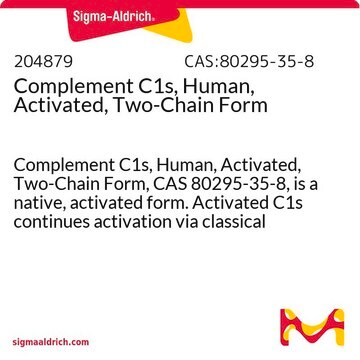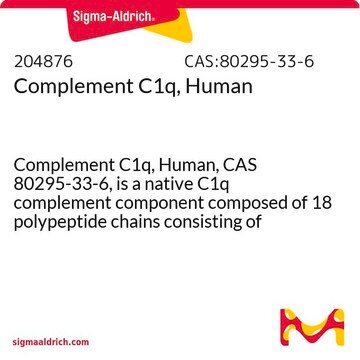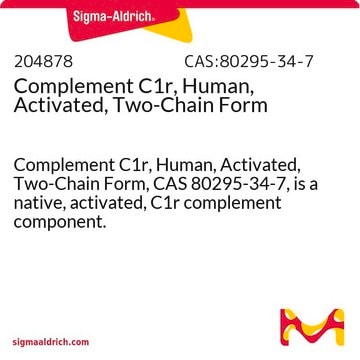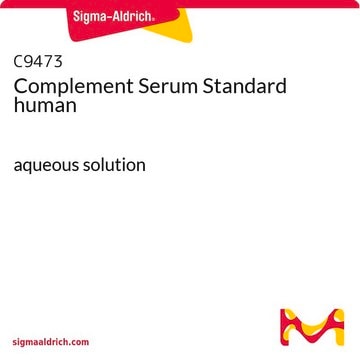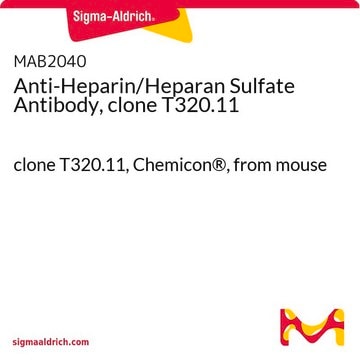204873
Complement C1, Human
Complement C1, Human Native, is the first component of the classical complement pathway. It is a calcium-dependent complex of C1q, C1r, and C1s subcomponents.
Iniciar sesiónpara Ver la Fijación de precios por contrato y de la organización
About This Item
Código UNSPSC:
12352202
NACRES:
NA.25
Productos recomendados
Nivel de calidad
formulario
liquid
fabricante / nombre comercial
Calbiochem®
condiciones de almacenamiento
OK to freeze
avoid repeated freeze/thaw cycles
Condiciones de envío
wet ice
temp. de almacenamiento
−70°C
Descripción general
Native, human C1 complement component. C1 is the first component of the classical complement pathway. It is a calcium dependent complex of C1q, C1r, and C1s subcomponents which are present in the C1 complex at molar ratios of 1:2:2 respectively. Binding of C1 to classical pathway activators results in the conversion of the proenzyme C1s subcomponent to an active C1s enzyme. C1s enzyme cleaves both C4 and C2, resulting in formation of the C3 cleaving enzyme, C4b, C2a, of the classical complement pathway. C1 concentration is based on functional activity measurements relative to a normal serum standard pool.
Native, human C1 complement component. C1 is the first component of the classical complement pathway. It is a calcium-dependent complex of C1q, C1r, and C1s subcomponents which are present in the C1 complex at molar ratios of 1:2:2, respectively. Binding of C1 to classical pathway activators results in the conversion of the proenzyme C1s subcomponent to an active C1s enzyme. C1s enzyme cleaves both C4 and C2 resulting in formation of the C3 cleaving enzyme, C4b, C2a, of the classical complement pathway. C1 concentration is based on functional activity measurements relative to a normal serum standard pool.
Envase
Please refer to vial label for lot-specific concentration.
Advertencia
Toxicity: Standard Handling (A)
Forma física
In 300 mM NaCl, 50 mM sodium acetate, 50 mM EACA, 25 µM NPGB, 10 mM benzamidine, 10 mM EDTA, 40% glycerol, pH 5.5.
Otras notas
Cooper, N.R. 1985. Adv. Immunol. 37, 151.
Ziccardi, R.J. and Cooper, N.R. 1977. J. Immunol. 118, 2047.
Ziccardi, R.J. and Cooper, N.R. 1977. J. Immunol. 118, 2047.
Información legal
CALBIOCHEM is a registered trademark of Merck KGaA, Darmstadt, Germany
Código de clase de almacenamiento
10 - Combustible liquids
Clase de riesgo para el agua (WGK)
WGK 1
Punto de inflamabilidad (°F)
Not applicable
Punto de inflamabilidad (°C)
Not applicable
Certificados de análisis (COA)
Busque Certificados de análisis (COA) introduciendo el número de lote del producto. Los números de lote se encuentran en la etiqueta del producto después de las palabras «Lot» o «Batch»
¿Ya tiene este producto?
Encuentre la documentación para los productos que ha comprado recientemente en la Biblioteca de documentos.
Réka Á Kovács et al.
Frontiers in immunology, 11, 599771-599771 (2021-02-26)
Elements of the immune system particularly that of innate immunity, play important roles beyond their traditional tasks in host defense, including manifold roles in the nervous system. Complement-mediated synaptic pruning is essential in the developing and healthy functioning brain and
Yitian Cai et al.
The Journal of biological chemistry, 290(37), 22570-22580 (2015-08-02)
In infection, complement C1q recognizes pathogen-congregated antibodies and elicits complement activation. Among endogenous ligands, C1q binds to DNA and apoptotic cells, but whether C1q binds to nuclear DNA in apoptotic cells remains to be investigated. With UV irradiation-induced apoptosis, C1q
Yitian Cai et al.
Journal of immunology (Baltimore, Md. : 1950), 199(12), 3981-3990 (2017-10-27)
Anti-nuclear autoantibodies, which frequently target the nucleoli, are pathogenic hallmarks of systemic lupus erythematosus (SLE). Although the causes of these Abs remain broad and ill-defined, a genetic deficiency in C1 complex (C1qC1r2C1s2) or C4 is able to induce these Abs.
Ahsan Habib et al.
Cell transplantation, 27(4), 666-676 (2018-06-07)
Alzheimer's Disease (AD) is the leading cause of dementia in the elderly. In healthy individuals, amyloid precursor protein (APP) is cleaved by α-secretase, generating soluble α-amyloid precursor protein (sAPPα), which contributes neuroprotective functions in the neuronal environment. In contrast, in
Nuestro equipo de científicos tiene experiencia en todas las áreas de investigación: Ciencias de la vida, Ciencia de los materiales, Síntesis química, Cromatografía, Analítica y muchas otras.
Póngase en contacto con el Servicio técnico
